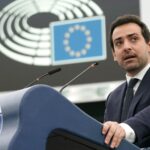They “did not mention Donald Trump, but his efforts to undermine NATO hung over their meetings”, summarizes Politico Europe. The American presidential candidate “and Russian President Vladimir Putin were on everyone’s minds” Monday, February 12, while the foreign ministers of France, Germany and the United Kingdom met outside Paris. Poland, in order to define common areas of action.
At the Château de La Celle-Saint-Cloud, Stéphane Séjourné, Annalena Baerbock and Radoslaw Sikorski notably announced a common mechanism to combat Russian disinformation, reports Deutsche Welle. “Russia is trying to destroy European unity,” explained Stéphane Sejourné, adding that nearly 200 fake news sites had been discovered. “These are attacks on our democracy,” said Annalena Baerbock, adding that the European Union cannot allow citizens’ trust to be shaken.
While in Washington “the partisan impasse endangers the crucial military aid provided to Ukraine”, as Politico recalls, the ministers also reiterated their support for kyiv. “Putin must not be allowed to win this war. We must fulfill our commitments to Ukraine,” declared Radoslaw Sikorski at the end of this tripartite meeting. “If [Russian President Vladimir] Putin thinks that our strength is diminishing and our support is dwindling, he is completely wrong,” insisted Annalena Baerbock.
The three heads of diplomacy also pleaded for a united Europe, a few days “after Donald Trump ignited the powder among the allies of the United States by declaring [during a meeting on Saturday] that he would “encourage” Russia to invade the countries of the [Atlantic Alliance] which are ‘behind’ on their defense budget”, reports Politico.
Ms Baerbock declared that Germany, France and Poland wanted to progress in the establishment of a unified European defense and security architecture, reports Deutsche Welle.
Relaunch meetings in “Weimar” format
The three European countries are trying to relaunch meetings in the “Weimar” format – Berlin, Paris and Warsaw – in order to strengthen cooperation on the challenges facing Europe, underlines Deutsche Welle.
This format, “created in 1991”, had “been frozen under the previous Polish government of the nationalist Law and Justice party”, explains Politico.
The Polish Prime Minister, Donald Tusk, who met on Monday the French President, Emmanuel Macron, in Paris and the German Chancellor, Olaf Scholz, in Berlin, declared that he wanted to “revitalize” his country’s relations with the main European partners, can – we read on the Los Angeles Times website.
However, there are “deep differences” within the trio, warns Politico. For example about the war in Ukraine. “Germany is by far the largest European donor of military aid to kyiv, with 17.1 billion euros, according to the Kiel Institute for the World Economy. Poland gave 3 billion euros and France only 544 million euros.”
This article is originally published on courrierinternational.com








